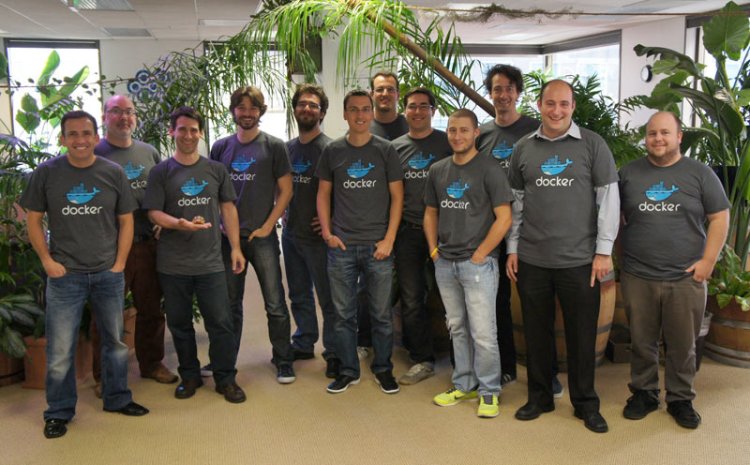Docker is turning into a genuine hit among developers.
The open-source tool, which lets engineers “package” pieces of code into containers that they can easily move from computer to computer, has been downloaded more than 400,000 times. Big companies have started using Docker in production, and top cloud providers have announced support for it. In October the company pivoted to rename itself Docker and focus on that technology.
So the company’s latest news, a $15 million round of new funding, comes as no surprise. And it’s also no surprise why former VMware executive Jerry Chen of Greylock Partners decided to join the board alongside Trinity Ventures’ Dan Scholnick. Chen worked on many kinds of software that sat on top of VMware’s core achievement of slicing up physical servers so multiple applications can run on them at the same time.
Alongside Greylock, Insight Venture Partners joined the round, along with previous investors Benchmark Capital, Trinity Ventures and Yahoo co-founder Jerry Yang. To date, Docker has now raised $26 million.
But investors didn’t initially love the idea. Docker, formerly known as cloud provider dotCloud, created Docker as a way of letting developers easily build and run applications. So when dotCloud proposed giving away its “special sauce” for free last year, its backers were skeptical.
“We didn’t really understand why [they] wanted to do it, and our initial reaction was to say, ‘Why don’t you focus on making the Platform as a Service (PaaS) business work?'” Trinity Ventures partner and early dotCloud investor Dan Scholnick said in an interview with VentureBeat.
Another company had offered to buy dotCloud, and the board members were entertaining that option, but simultaneously they were thinking about how dotCloud could become more commercially viable on its own, Scholnick said.
But dotCloud’s investors pushed aside their concerns and put their trust in founder Solomon Hykes, who went ahead and open-sourced Docker last March.
The bet paid off, and the company eventually decided it was doing so well that it needed to focus on Docker.
Like virtual machines, Docker’s containers hold pieces of code that together form the guts of applications. Developers can simply take the containers they assemble on their own laptops and move them to public or private clouds — like shipping containers can move from truck to ship to truck — in a snap, without needing to revise their applications. That’s usually a time-consuming step in the development process. With Docker containers, deploying apps — for testing or other purposes — is super fast.
Now it’s a question of how the company will advance itself from here.
Chen’s perspective should help the company devise a series of tools that build on the basic Docker container technology, especially considering the parallels between Docker containers and the virtual machines at the root of VMware.
Commercial products could include a management tool to see where exactly a company’s containers are running and a way to see which developer launched a particular Docker container, said Docker’s chief executive, Ben Golub.
“In this case, pricing will probably look more like what people are accustomed to seeing from services like GitHub,” Golub said in an interview.
And the payment structure for Docker’s commercial support for its open-source technology would resemble the subscription model Red Hat employs, Golub said.
Recent sales and support hires from open-source companies Red Hat and Puppet Labs are likely to be useful as Docker moves to sell and provide commercial support for its forthcoming commercial services.
Along with the matter of what commercial services will come out, part of Docker’s future also hinges on what becomes of the PaaS business that gave rise to Docker in the first place. For now, the company is still running that business, too.
“I can confirm that people have approached us” about an acquisition of that business, Golub said. Perhaps a sell-off will come to pass — or perhaps Docker will continue to operate the PaaS.
No matter what happens, Golub said the company wants to take care of its PaaS customers, and that means any transition to another provider would have to be smooth.
In any case, Scholnick doesn’t sound worried about the prospects for San Francisco-based Docker, which has 27 employees.
“I have very high confidence that if Docker is successful in becoming this standard, there are ways we can add value on top of it that our users will want to pay for and can generate a lot of revenue for the company,” he said.
VentureBeat's mission is to be a digital town square for technical decision-makers to gain knowledge about transformative enterprise technology and transact. Learn More

